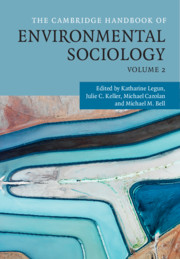Book contents
- The Cambridge Handbook of Environmental Sociology Volume 2
- The Cambridge Handbook of Environmental Sociology
- Copyright page
- Contents
- Figures
- Tables
- Contributors
- Foreword
- Introduction
- Part I Methods
- Part II Embodied Environmental Sociology
- Part III Beyond the Human
- Part IV Sustainability and Climate Change
- Part V Resources
- Part VI Food and Agriculture
- Part VII Social Movements
- 26 Alternative Technologies and Emancipatory Environmental Practice
- 27 The Global Fair Trade Movement: For Whom, By Whom, How, and What Next
- 28 Possibilities for Degrowth: A Radical Alternative to the Neoliberal Restructuring of Growth-Societies
- 29 Achieving Environmental Justice: Lessons from the Global South
- 30 Conclusion: Envisioning Futures with Environmental Sociology
- Index
- References
30 - Conclusion: Envisioning Futures with Environmental Sociology
from Part VII - Social Movements
Published online by Cambridge University Press: 05 November 2020
- The Cambridge Handbook of Environmental Sociology Volume 2
- The Cambridge Handbook of Environmental Sociology
- Copyright page
- Contents
- Figures
- Tables
- Contributors
- Foreword
- Introduction
- Part I Methods
- Part II Embodied Environmental Sociology
- Part III Beyond the Human
- Part IV Sustainability and Climate Change
- Part V Resources
- Part VI Food and Agriculture
- Part VII Social Movements
- 26 Alternative Technologies and Emancipatory Environmental Practice
- 27 The Global Fair Trade Movement: For Whom, By Whom, How, and What Next
- 28 Possibilities for Degrowth: A Radical Alternative to the Neoliberal Restructuring of Growth-Societies
- 29 Achieving Environmental Justice: Lessons from the Global South
- 30 Conclusion: Envisioning Futures with Environmental Sociology
- Index
- References
Summary
In the final chapter of this far-reaching handbook, we turn to the future of the field, giving special attention to the most exciting and promising developments in theory and practice. But first, we want to retrace our steps to remind the reader of our intentions in putting together this collection.
Environmental sociology has become quite broad and highly multifaceted in a short period of time. As one of us has noted elsewhere (Bell & Ashwood, 2016), in the late 1990s social scientists had just begun thinking about environmental questions. Now, however, the idea that the social sciences have something to offer to the study of environmental problems is unlikely to give one pause.
- Type
- Chapter
- Information
- The Cambridge Handbook of Environmental Sociology , pp. 515 - 522Publisher: Cambridge University PressPrint publication year: 2020



